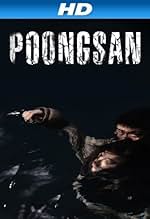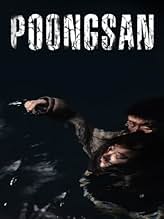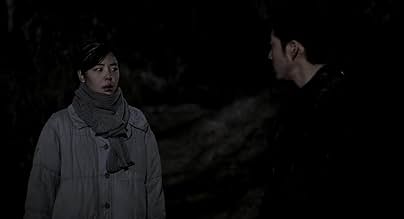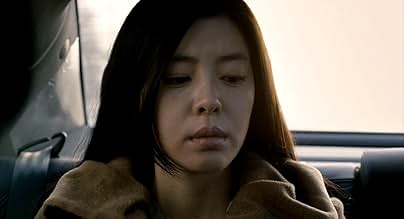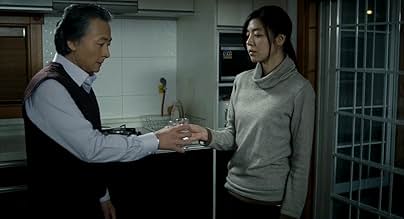Agrega una trama en tu idiomaA young man crosses over North and South Korea to deliver the pain and longings of separated families.A young man crosses over North and South Korea to deliver the pain and longings of separated families.A young man crosses over North and South Korea to deliver the pain and longings of separated families.
- Dirección
- Guionista
- Elenco
- Premios
- 1 premio ganado y 6 nominaciones en total
Yoon Kyesang
- Poongsan
- (as Kye Sang Yoon)
Kim Gyu-ri
- In-ok
- (as Gyu-ri Kim)
Kim Jong-soo
- North Korea defect executive
- (as Jong-soo Kim)
Choi Moo-seong
- Team leader
- (as Moo-Seong Choi)
Yu Ha-bok
- North Korea executive
- (as Ha-bok Yu)
Cho Jae-ryong
- Hit team 2
- (as Jo Jae-Ryong)
Jung Jae-min
- North Korean child
- (as Jae-Min Jung)
Kim Jae-rok
- Yoon-Nim's son
- (as Jae-rok Kim)
Wi Ji-woong
- Sentry 1
- (as Ji-woong Wi)
- Dirección
- Guionista
- Todo el elenco y el equipo
- Producción, taquilla y más en IMDbPro
Argumento
¿Sabías que…?
- ConexionesFeatured in Bulg-eun gajog (2013)
Opinión destacada
Although Poongsan possesses thematic elements of romance, drama and humor, it is none of these. Poongsan is one of those rare films that some viewers may potentially want to avoid, for it tragically reveals the horrors that exist in the world around us. Though other films provide viewers with entertainment, Poongsan drags us into a bloody world of poignant realism and painful drama, where men and women are brutally tortured, for no other reason than because they happen to reside on the opposite side of a fence separating their countries. It's a film, where North Korean 'traitors' are force fed expensive items, where South Koreans execute spies without remorse, and where love is so easily devoured by the all consuming hatred that surrounds opposing nations.
Although obviously produced on a budget, everything in the feature is brilliantly used to great effect. Many of the film's settings are either only partially seen, or filmed under the cover of night, accentuating the haunting darkness of the film. However, this doesn't take away from the barren wasteland that depicts North Korea, or the South's contrast: a westernized utopia, corrupting all with its influential privileges.
An unnamed stranger, identified only by the Poongsan cigarettes he smokes, travels covertly between the borders of North and South Korea. He takes messages of love from the South, to their families in the North, and occasionally returns with messages, items, and sometimes, people. Yoon Kye-Sang is perfect in this role. He never speaks, but superbly conveys his emotions through facial gesture, one of the film's most powerful scenes conveying the moment he reveals his heart.
Though set in chronological order, the film quickly skips forward: one moment, characters are naked, swimming in a river, next second, they're fully clothed and on land. This deliberate strategy, utilized so the film can urgently tell its story, potentially provides reason as to how the stranger can be horrifically injured one moment, and yet athletically capable the next. Fight scenes, despite being well choreographed, are not only few in number and short-lived, but occasionally unrealistic: vaulting over a fence is just one example where the audience's disbelief is in need of temporary suspension, and the way Northerners, and those from the South, are able to slip across the border with ease, potentially demonstrates a flaw in the system.
When a South Korean section chief (Han Ki-Joong) finds evidence that corroborates the existence of the unidentified stranger, he and his team track him down for a job. A defector from the North (Kim Jong-Soo) desperately wishes to see his wife, In-OK (Kim Gyu-Ri), who still resides on the other side of the border, in exchange to provide further information to the South. Once reunited with her husband, In-OK, who experiences difficulty acclimatising to the environment, discovers her husband is a changed man. Greedy, arrogant, jealous and violent, In-OK's heart quickly changes allegiances, instead belonging to the man who extracted her.
Occasional poetic language is supported not only by the visuals, which are capable of articulating metaphoric symbolism, but by the soundtrack, which encapsulates the emotions experienced in its accompanying moments. One particular vocal serenade, produced over the body of a deceased lover, is especially effective. With all the pain the film articulates, it's difficult to imagine how humor could be used, often articulating the ridiculousness of the confrontation the South and the North are caught between, while discussing how people on one side of the border die of starvation, while those on the opposing side grow fat on money and resources. In one instance, a South Korean spy, who proclaims his love for the North, is asked by his Northern torturer why he loves the country, because not even the torturer is capable of doing so.
Over the course of the feature I personally didn't cry, however, during the credits, everything the film had explored inexplicably hit me at once, and I found myself unable to stem the tears as I wondered 'what's the point?' I don't give Poongsan a 10 with ease, for it's a film that is seldom entertaining, and even during moments of beauty, these are marred by decadence. However, this feature does what so few fail to do these days: it tells the truth.
Although obviously produced on a budget, everything in the feature is brilliantly used to great effect. Many of the film's settings are either only partially seen, or filmed under the cover of night, accentuating the haunting darkness of the film. However, this doesn't take away from the barren wasteland that depicts North Korea, or the South's contrast: a westernized utopia, corrupting all with its influential privileges.
An unnamed stranger, identified only by the Poongsan cigarettes he smokes, travels covertly between the borders of North and South Korea. He takes messages of love from the South, to their families in the North, and occasionally returns with messages, items, and sometimes, people. Yoon Kye-Sang is perfect in this role. He never speaks, but superbly conveys his emotions through facial gesture, one of the film's most powerful scenes conveying the moment he reveals his heart.
Though set in chronological order, the film quickly skips forward: one moment, characters are naked, swimming in a river, next second, they're fully clothed and on land. This deliberate strategy, utilized so the film can urgently tell its story, potentially provides reason as to how the stranger can be horrifically injured one moment, and yet athletically capable the next. Fight scenes, despite being well choreographed, are not only few in number and short-lived, but occasionally unrealistic: vaulting over a fence is just one example where the audience's disbelief is in need of temporary suspension, and the way Northerners, and those from the South, are able to slip across the border with ease, potentially demonstrates a flaw in the system.
When a South Korean section chief (Han Ki-Joong) finds evidence that corroborates the existence of the unidentified stranger, he and his team track him down for a job. A defector from the North (Kim Jong-Soo) desperately wishes to see his wife, In-OK (Kim Gyu-Ri), who still resides on the other side of the border, in exchange to provide further information to the South. Once reunited with her husband, In-OK, who experiences difficulty acclimatising to the environment, discovers her husband is a changed man. Greedy, arrogant, jealous and violent, In-OK's heart quickly changes allegiances, instead belonging to the man who extracted her.
Occasional poetic language is supported not only by the visuals, which are capable of articulating metaphoric symbolism, but by the soundtrack, which encapsulates the emotions experienced in its accompanying moments. One particular vocal serenade, produced over the body of a deceased lover, is especially effective. With all the pain the film articulates, it's difficult to imagine how humor could be used, often articulating the ridiculousness of the confrontation the South and the North are caught between, while discussing how people on one side of the border die of starvation, while those on the opposing side grow fat on money and resources. In one instance, a South Korean spy, who proclaims his love for the North, is asked by his Northern torturer why he loves the country, because not even the torturer is capable of doing so.
Over the course of the feature I personally didn't cry, however, during the credits, everything the film had explored inexplicably hit me at once, and I found myself unable to stem the tears as I wondered 'what's the point?' I don't give Poongsan a 10 with ease, for it's a film that is seldom entertaining, and even during moments of beauty, these are marred by decadence. However, this feature does what so few fail to do these days: it tells the truth.
- totalovrdose
- 6 abr 2015
- Enlace permanente
Selecciones populares
Inicia sesión para calificar y agrega a la lista de videos para obtener recomendaciones personalizadas
Detalles
Taquilla
- Total a nivel mundial
- USD 5,110,929
- Tiempo de ejecución2 horas 1 minuto
- Color
- Mezcla de sonido
- Relación de aspecto
- 16:9 HD
Contribuir a esta página
Sugiere una edición o agrega el contenido que falta

Principales brechas de datos
By what name was Poongsan gae (2011) officially released in India in English?
Responda
